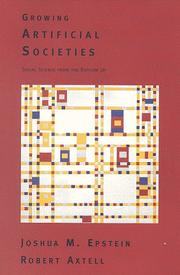| Listing 1 - 10 of 37 | << page >> |
Sort by
|
Book
ISBN: 9033443732 Year: 1999 Publisher: Leuven Acco
Abstract | Keywords | Export | Availability | Bookmark
 Loading...
Loading...Choose an application
- Reference Manager
- EndNote
- RefWorks (Direct export to RefWorks)
Sociologie --- bureaucratie --- macht --- socialisatie --- sociale processen --- 316.4 --- Sociology --- -Academic collection --- sociologie --- sociologie, cultuur --- Social theory --- Social sciences --- 65.014 --- 301.17 --- Sociale processen --- Philosophy --- sociology --- 316.4 Sociale processen --- Academic collection
Book
ISBN: 9789047009610 9047009614 Year: 2016 Publisher: Amsterdam Business Contact
Abstract | Keywords | Export | Availability | Bookmark
 Loading...
Loading...Choose an application
- Reference Manager
- EndNote
- RefWorks (Direct export to RefWorks)
Er wordt van alles uit de kast gehaald om het gedrag van mensen te veranderen: humor, celebrities, nudging en veel (te veel) informatie. Gedragsverandering is een actueel onderwerp: jongeren moeten minder drinken, autorijders voorzichtiger rijden, medewerkers stressvrijer werken. Bij de overheid, maar ook in het bedrijfsleven worden (reclame)campagnes, acties, (digitale) producten en online toepassingen ontworpen. Met wisselend succes.Wetenschappers Sander Hermsen en Reint Jan Renes laten in een levendige mix van concrete voorbeelden en de nieuwste inzichten zien hoe gedragsbeïnvloeding echt werkt. Wat maakt wel en wat maakt niet een effectieve campagne, product of dienst ? Hun model, Persuasive by Design, is al in een groot aantal organisaties met succes toegepast. Dit boek is voor iedereen die wat te winnen heeft bij gezonder, veiliger, duurzamer of efficiënter gedrag. Bron : http://www.bol.com
Industrial psychology --- Social psychology --- Beïnvloeden --- sociale processen --- 301.17 --- Gedrag --- Gedragsverandering --- Gedragspsychologie --- Beïnvloeding --- Psychologie --- Man --- Volwassene
Book
ISBN: 9789083054209 Year: 2020 Publisher: Amsterdam Uitgeverij Pluim
Abstract | Keywords | Export | Availability | Bookmark
 Loading...
Loading...Choose an application
- Reference Manager
- EndNote
- RefWorks (Direct export to RefWorks)
Toen The New York Times Amsterdam-Noord vergeleek met Brooklyn en op nummer drie plaatste in hun jaarlijkse lijst van onontdekte parels die je bezocht moét hebben, maakte Massih Hutak zich zorgen. Want nu was de buurt hip, maar hij constateerde dat tegelijkertijd meer en meer bewoners en ondernemers in de problemen kwamen door de steeds hogere huren. Zij profiteerden niet mee van de investeringen die nu in de buurt werden gedaan. Dit gebeurt niet alleen in Amsterdam, maar overal ter wereld. San Francisco, Los Angeles, Londen, Parijs en Berlijn, overal zag hij hetzelfde fenomeen: de oorspronkelijke bewoners worden in hoog tempo vervangen door nieuwe, vaak jonge bewoners, met hogere inkomens. Hippe koffietenten nemen de plaats in van de oude groente- en fruitboer. Dure koopwoningen voor de happe few komen in de plaats van betaalbare huur. Gentrificatie, heet dit, en het is geen natuurverschijnsel, maar het resultaat van beleid. Getuige van de veranderingen in zijn eigen buurt ging Massih Hutak op zoek naar hoe het werkt, en naar een antwoord op de vraag hoe steden kunnen groeien en oude en nieuwe bewoners samen kunnen leven; Want de stad moet een plek voor iedereen zijn.
Sociology of environment --- Environmental planning --- Dutch literature --- sociale processen --- buurtontwikkeling --- stadsontwikkeling --- stadsvernieuwing --- Gentrificatie.

ISBN: 9029053712 Year: 1997 Publisher: Amsterdam Meulenhoff
Abstract | Keywords | Export | Availability | Bookmark
 Loading...
Loading...Choose an application
- Reference Manager
- EndNote
- RefWorks (Direct export to RefWorks)
Social change --- History of civilization --- Civilization --- Sociology --- Time --- Philosophy. --- Social aspects. --- sociologie --- sociale structuur --- sociologie, cultuur --- #SBIB:93H3 --- 316.4 --- Thematische geschiedenis --- Sociale processen --- 316.4 Sociale processen --- Philosophy and civilization --- Philosophy --- Social aspects

ISBN: 0262050536 0262550253 0262272369 0585033579 0262550261 9780262272360 9780585033570 9780262050531 9780262550253 9780262550260 Year: 1996 Publisher: Washington, D.C.: Brookings Institution,
Abstract | Keywords | Export | Availability | Bookmark
 Loading...
Loading...Choose an application
- Reference Manager
- EndNote
- RefWorks (Direct export to RefWorks)
How do social structures and group behaviors arise from the interaction of individuals? Growing Artificial Societies approaches this question with cutting-edge computer simulation techniques. Fundamental collective behaviors such as group formation, cultural transmission, combat, and trade are seen to "emerge" from the interaction of individual agents following a few simple rules. In their program, named Sugarscape, Epstein and Axtell begin the development of a "bottom up" social science that is capturing the attention of researchers and commentators alike. The study is part of the 2050 Project, a joint venture of the Santa Fe Institute, the World Resources Institute, and the Brookings Institution. The project is an international effort to identify conditions for a sustainable global system in the next century and to design policies to help achieve such a system. Growing Artificial Societies is also available on CD-ROM, which includes about 50 animations that develop the scenarios described in the text. Copublished with the Brookings Institution.
Social sciences --- Sciences sociales --- Social Sciences --- Social Sciences - General --- #SBIB:3 G --- 316.4 --- Sociale Wetenschappen: algemeen --- Sociale processen --- 316.4 Sociale processen --- Behavioral sciences --- Human sciences --- Sciences, Social --- Social science --- Social studies --- Civilization --- Social sciences. --- COMPUTER SCIENCE/General

ISBN: 9780521696937 9780521874236 0521874238 0521696933 9780511618932 9780511290350 0511290357 0511289758 9780511289750 051161893X 1107181585 1280917164 9786610917167 0511288468 0511322372 0511289146 Year: 2007 Publisher: Cambridge : Cambridge University Press,
Abstract | Keywords | Export | Availability | Bookmark
 Loading...
Loading...Choose an application
- Reference Manager
- EndNote
- RefWorks (Direct export to RefWorks)
How do we reflect upon ourselves and our concerns in relation to society, and vice versa? Human reflexivity works through 'internal conversations' using language, but also emotions, sensations and images. Most people acknowledge this 'inner-dialogue' and can report upon it. However, little research has been conducted on 'internal conversations' and how they mediate between our ultimate concerns and the social contexts we confront. In this book, Margaret Archer argues that reflexivity is progressively replacing routine action in late modernity, shaping how ordinary people make their way through the world. Using interviewees' life and work histories, she shows how 'internal conversations' guide the occupations people seek, keep or quit; their stances towards structural constraints and enablements; and their resulting patterns of social mobility.
316.37 --- 316.4 --- Identiteit. Individu en maatschappij. Persoonlijkheid --- Sociale processen --- Reflection (Philosophy) --- Social mobility. --- Movilidad social. --- Reflection (Philosophy). --- 316.4 Sociale processen --- 316.37 Identiteit. Individu en maatschappij. Persoonlijkheid --- Social mobility --- Mobility, Social --- Sociology --- Philosophy --- Social Sciences
Book
ISBN: 2130389481 Year: 1984 Volume: *43
Abstract | Keywords | Export | Availability | Bookmark
 Loading...
Loading...Choose an application
- Reference Manager
- EndNote
- RefWorks (Direct export to RefWorks)
Changement social --- Social change --- Sociale verandering --- 316.4 --- 316.4 Sociale processen --- Sociale processen --- Economic development --- Civilization, Modern --- Sociology --- Développement économique --- Civilisation --- Sociologie --- Social aspects --- Methodology --- Aspect social --- Méthodologie --- Sciences sociales
Book
ISBN: 9035116593 Year: 2001 Publisher: Amsterdam : Bakker,
Abstract | Keywords | Export | Availability | Bookmark
 Loading...
Loading...Choose an application
- Reference Manager
- EndNote
- RefWorks (Direct export to RefWorks)
Sociology --- globalisering --- sociologie --- maatschappij --- 316.32 --- 316.4 --- 316.47 --- sociale structuur --- Globale samenlevingsvormen --- Sociale processen --- Sociale relaties --(sociologie) --- 316.47 Sociale relaties --(sociologie) --- 316.4 Sociale processen --- 316.32 Globale samenlevingsvormen --- 301 --- 310 --- samenleving

ISBN: 0803983204 9780803983205 Year: 1990 Publisher: London: Sage,
Abstract | Keywords | Export | Availability | Bookmark
 Loading...
Loading...Choose an application
- Reference Manager
- EndNote
- RefWorks (Direct export to RefWorks)
316.4 --- Sociale processen --- Education --- Educational sociology. --- Philosophy. --- 316.4 Sociale processen --- Educational sociology --- 316.2 BOURDIEU, PIERRE --- Education and sociology --- Social problems in education --- Society and education --- Sociology, Educational --- Sociology --- 316.2 BOURDIEU, PIERRE Sociologische richtingen. Sociologische scholen. Sociologen--BOURDIEU, PIERRE --- Sociologische richtingen. Sociologische scholen. Sociologen--BOURDIEU, PIERRE --- Philosophy --- Aims and objectives --- Sociologie de l'éducation --- Philosophie --- Education - Philosophy --- Education - Philosophie
Book
ISBN: 9089643028 9786613050526 9048514010 1283050528 9789048514014 9789089643025 Year: 2011 Publisher: Amsterdam : Amsterdam University Press,
Abstract | Keywords | Export | Availability | Bookmark
 Loading...
Loading...Choose an application
- Reference Manager
- EndNote
- RefWorks (Direct export to RefWorks)
The knowledge about how human choices are made has grown considerably in recent years. Fields such as social psychology and brain science are booming, especially in the Netherlands. The very accessible written book How people make choices: the psychology of decision-making gives in more than 100 pages a unique overview of the latest social-psychological insights in this area. In four chapters the 'limitations' of the brain are highlighted: - The irrational brain. People often do not follow the rules for logical and rational choices. However, this sometimes leads to even better decisions. - The automatic brain. Our choices are determined by all kinds of unconscious factors, and we often don't know why we made a certain choice. - The mindless brain. Are we really free to choose? Today, a number of scientists claim that free will does not exist. Are they right? - The social brain. Is man in heart and soul a social being who is really concerned with someone else's fate? Or is it just a thin layer of civilization? The last chapter looks at what the Netherlands would look like if policymakers made use of these findings when setting out policy. How can people be tempted into a healthier lifestyle? To energy-saving behavior? To sensible financial planning? And maybe it can even do something about the chronic political discontent in people.
Decision making. --- Decision making --- Deciding --- Decision (Psychology) --- Decision analysis --- Decision processes --- Making decisions --- Management --- Management decisions --- Choice (Psychology) --- Problem solving --- Psychological aspects. --- 316.4 --- 316.64 --- #SBIB:35H412 --- 415.4 --- besluitvorming --- hersenen --- keuzevrijheid --- 316.4 Sociale processen --- Sociale processen --- 316.64 Maatschappelijke attitudes --(sociale psychologie) --- Maatschappelijke attitudes --(sociale psychologie) --- Beleidscyclus: vaststelling, besluitvorming --- Hogere geestelijke functies --- Decision making ‡x Psychological aspects.
| Listing 1 - 10 of 37 | << page >> |
Sort by
|

 Search
Search Feedback
Feedback About UniCat
About UniCat  Help
Help News
News